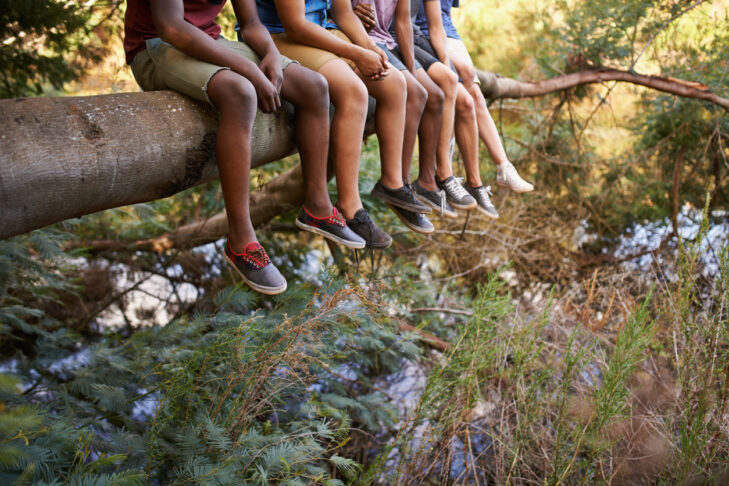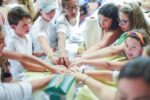You’ve heard it before, and I’ll say it again: We are facing unprecedented and scary times. COVID-19 has impacted every facet of our lives—from work, to school, to parenting, to home responsibilities and more. Everything we’ve come to recognize as “normal” has suddenly turned upside down, and here we are, weeks into this “new normal,” unsure when it will end.
As a therapist for adults, kids and adolescents who focuses on anxiety, I am noticing some key themes in my work. The first is that the sudden changes we are experiencing have overwhelmed us. At any given moment, we are being pulled in multiple directions. It can feel like we are failing on all fronts. And yet, all we can do is continue one day at a time.
What we are experiencing can be tied to grief. We are grieving routines that helped us feel grounded and be our best selves. And we are doing this in a time when we are also experiencing so much loss, grieving events that were to come during these months—weddings, b’nai mitzvot, graduations, holidays and so much more. These losses make the extremity of our current situation inexplicably real.
The three types of grief we experience as people are real, imaginary and anticipated. As I continue to “see” patients virtually, I realize more and more that many of us are experiencing all three types of grief. The real grief addresses what we have already lost in this pandemic. Imaginary grief is the loss of the fantasy or assumption of what our lives would be like. Anticipated grief is looking ahead and preparing for an impending loss.
Anticipated grief leads us to thinking about the summer. With the summer months looming over us, this anticipation is around the unfortunate possibility that camps will not open for the summer.
For camp enthusiasts—parents and kids alike—this is unfathomable. We live 10 months of the year for those two months at camp. In what world is it possible that camp can’t happen? For people who don’t totally grasp what camp brings into our lives, this might seem like a minor loss. For those of us who have experienced the true magic and transformational experience of attending and working at a beloved summer camp year after year, the prospect of a lost summer at camp is devastating.
The anticipated loss hurts because camp is a utopian projection of community. In this youth-centered imagined community, what we imagine becomes real. I think this magnifies the anticipated loss for campers, staff, their parents and communities.
Related
Camp offers this opportunity by providing many different outlets to express the authentic self. If a camper enjoys art, art can be the focus of camp for them by creating a mural or a stage set. If a camper loves to dance, there’s the dance team, leadership opportunities and costume creativity. There’s color war, mealtimes, nighttime routines, singing and so many more chances every day to find joy and confidence.
With the independence that camp offers, kids have an opportunity to play a different role than in their social hierarchy back home. Often, the loudest campers are the quietest students back in their school setting.
A phenomenon I have witnessed as both a seasoned camp counselor and therapist is the evolution of authenticity related to summer camps. Whether it’s personalities, genders, clothing style or another facet of identity, campers are often provided a space to be themselves wholeheartedly in a way that can feel impossible in their home lives. Home life can feel overly structured and claustrophobic when it comes to fitting in to a social hierarchy or family dynamic. Because of the immersive nature of camp relationships, friendships built at camp have been found to provide safety and security, and timelessness that other relationships often cannot offer due to being outside of the regular environment and away from parents and rigid social settings.
Counselors also benefit from this opportunity to shine as themselves in the camp setting. Counselors might be nervous to lead or take control in their lives. At camp, counselors become mentors and are often looked up to by their campers. Camp is a family and the energy is on its own level.
The question remains: What do we do if our current situation keeps camp from opening this summer? How do we respond to this type of loss and give space for our campers and counselors to grieve?
As a therapist, my best advice is the following: validate, validate, validate. When feelings of grief are avoided, grief becomes complicated or traumatic. When grief is addressed and accepted, it has been shown to present an opportunity to be resolved. If your child is crying, cry with them. Hold them. Tell them you are so sad for them. Do not try to brush this off. This is truly devastating for these campers.
If your child is a younger camper, talk about all the upcoming summers that are going to be even more special and appreciated after experiencing the loss of this expected summer. Talk about what they were excited for, and also what you can do at home that could bring some hope—and, dare I say, excitement. Give them the space to grieve and connect with their friends who are experiencing the same loss. FaceTime all their friends to commiserate! If camp teaches us anything, it’s that community makes everything better, especially in a time like this.
If you have an older camper, this conversation is harder. After validating, the focus needs to be on what they might need to heal. They might not know yet, but some ideas might be visiting friends or getting together with groups (once the restrictions decrease) and connecting with their peers to commiserate together.
Parents can and should look to camps to create opportunities to connect with their community, such as shared projects, Shabbat singing and more. Is there a virtual project that can become a camp art installation, or an opportunity for older campers to be part of conversations on how to bring camp home? There are a million ways to collaborate during this time, and there is no reason not to attempt togetherness and community. Companionship will do wonders.
Lastly, search for local activities or online groups in which your child can participate that inspire a similar sense of authenticity and freedom. Of course, in no way would this replace camp. However, if your child loves to lead at camp, maybe there is an improv class online or a community group that might incorporate leadership skills. The focus can be on what camp brings out in them and brainstorming the possibilities at home to bring out these strengths.
None of these ideas are going to wipe away the tears and immense sadness connected to the loss of a summer at camp, but perhaps some of these ideas will bring a new perspective and new memories.
One loss that we haven’t touched on is the role of camp for parents: a much-needed break from the routine and demands parents face during the rest of the year. Of course, we miss our children when they go to camp, but it’s also a time for us as parents to experience relief from some of the hustle of day-to-day life. It’s OK to feel this way, and it’s OK to be sad that this break—and so much else—has been taken from you this year. Be gentle with yourself. This is a loss for you, too. Think about self-care during this time.
While this is all new and challenging, we adults have a few tools at our disposal. We have developed brains that help us with rational thinking (most of the time). We have words to express our feelings and we have control over our households (again, most of the time). It’s our job as parents to offer words and feelings and opportunities to help weather the current storm.
This post has been contributed by a third party. The opinions, facts and any media content are presented solely by the author, and JewishBoston assumes no responsibility for them. Want to add your voice to the conversation? Publish your own post here. MORE




